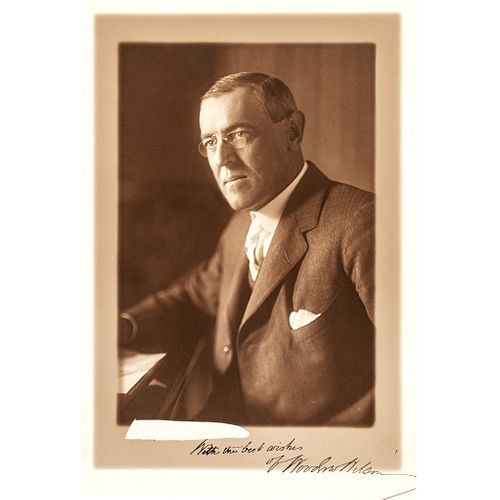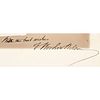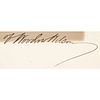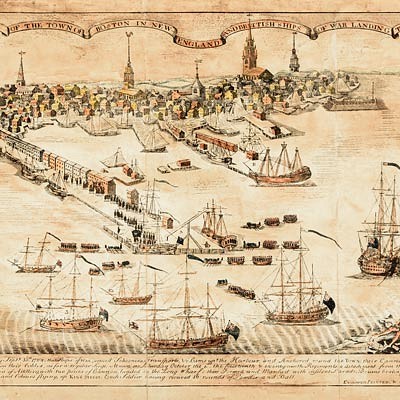President WOODROW WILSON Signed and Inscribed Studio Photograph
Lot 89
Categories
Estimate:
$700 - $800
Absentee vs Live bid
Two ways to bid:
- Leave a max absentee bid and the platform will bid on your behalf up to your maximum bid during the live auction.
- Bid live during the auction and your bids will be submitted real-time to the auctioneer.
Bid Increments
| Price | Bid Increment |
|---|---|
| $0 | $10 |
| $200 | $20 |
| $300 | $25 |
| $500 | $50 |
| $1,000 | $100 |
| $2,000 | $200 |
| $3,000 | $250 |
| $5,000 | $500 |
| $10,000 | $1,000 |
| $20,000 | $2,000 |
| $30,000 | $2,500 |
| $50,000 | $5,000 |
| $100,000 | $10,000 |
| $200,000 | $20,000 |
| $300,000 | $25,000 |
| $500,000 | $50,000 |
About Auction
By Early American History Auctions
Mar 20, 2021
Set Reminder
2021-03-20 12:00:00
2021-03-20 12:00:00
America/New_York
Bidsquare
Bidsquare : Autographs-Colonial-Political-Americana
https://www.bidsquare.com/auctions/early-american-history-auctions/autographs-colonial-political-americana-6509
330 Lots of Rare, Historic Autographs, Americana, Civil War Era, George Washington, Abraham Lincoln, Slavery & Black History, Revolutionary War Era, Colonial America, Federal Period, War of 1812, Colonial Currency, Indian Peace Medals & more... Early American History Auctions auctions@earlyamerican.com
330 Lots of Rare, Historic Autographs, Americana, Civil War Era, George Washington, Abraham Lincoln, Slavery & Black History, Revolutionary War Era, Colonial America, Federal Period, War of 1812, Colonial Currency, Indian Peace Medals & more... Early American History Auctions auctions@earlyamerican.com
- Lot Description
Autographs
President WOODROW WILSON Signed Studio Photo
WOODROW WILSON (1856-1924). 28th President of the United States (1913-1921), winner of the Noble Peace Prize (1919), noted for his "Fourteen Points" that helped establish the League of Nations.
Superb quality Signed & Inscribed Professional Studio Photograph of President Woodrow Wilson with bold signature in black ink reading "With the best wishes / of Woodrow Wilson", apparently signed as President, Choice Extremely Fine. This Photo measures 7.25" x 10.75" and is printed on thick photo cardstock that measures 9.75" x 13.75". Very attractive sepia-tone photo clean with nice contrast. With its original cardboard Harris & Ewing heavy card folder that measures 10" x 14" embossed with lettering top left that reads, "Harris & Ewing / HE / Washington, D.C.". There is a cut out the surface of the photo at lower left which originally had a personalized name with the inscription as shown, yet the remainder of this photo has to no damage and has excellent eye appeal for display. (2 items)
Thomas Woodrow Wilson (December 28, 1856 - February 3, 1924) was an American politician and academic who served as the 28th president of the United States from 1913 to 1921.
A member of the Democratic Party, Wilson served as the president of Princeton University and as the 34th governor of New Jersey before winning the 1912 presidential election. As president, he oversaw the passage of progressive legislative policies unparalleled until the New Deal in 1933. He also led the United States into World War I in 1917, establishing an activist foreign policy known as Wilsonianism. He was the leading architect of the League of Nations.
Wilson spent his early years in the American South, mainly in Augusta, Georgia, during the Civil War and Reconstruction. After earning a Ph.D. in political science from Johns Hopkins University, Wilson taught at various schools before becoming the president of Princeton University.
As governor of New Jersey from 1911 to 1913, Wilson broke with party bosses and won the passage of several progressive reforms. His success in New Jersey gave him a national reputation as a progressive reformer, and he won the presidential nomination at the 1912 Democratic National Convention.
Wilson defeated incumbent Republican President William Howard Taft and Progressive Party nominee former president Theodore Roosevelt to win the 1912 United States presidential election, becoming the first Southerner to be elected president since the American Civil War.
During his first term, Wilson presided over the passage of his progressive New Freedom domestic agenda. His first major priority was the passage of the Revenue Act of 1913, which lowered tariffs and implemented a federal income tax. Later tax acts implemented a federal estate tax and raised the top income tax rate to 77 percent.
Wilson also presided over the passage of the Federal Reserve Act, which created a central banking system in the form of the Federal Reserve System. Two major laws, the Federal Trade Commission Act and the Clayton Antitrust Act, were passed to regulate and break up large business interests known as trusts. To the disappointment of his African-American supporters, Wilson allowed some of his Cabinet members to segregate their departments.
Upon the outbreak of World War I in 1914, Wilson maintained a policy of neutrality between the Allied Powers and the Central Powers. He won re-election by a narrow margin in the 1916 United States presidential election, defeating Republican nominee Charles Evans Hughes.
In early 1917, Wilson asked Congress for a declaration of war against the German Empire after it implemented a policy of unrestricted submarine warfare, and Congress complied. Wilson presided over war-time mobilization but devoted much of his efforts to foreign affairs, developing the Fourteen Points as a basis for post-war peace.
After Germany signed an armistice in November 1918, Wilson and other Allied leaders took part in the Paris Peace Conference, where Wilson advocated for the establishment of a multilateral organization, per his "fourteenth point". The resulting League of Nations was incorporated into the Treaty of Versailles and other treaties with the defeated Central Powers, but Wilson was subsequently unable to convince the Senate to ratify that treaty or allow the United States to join the League. Wilson had an illness during the conference, and some experts believe the Spanish flu was the cause.
Wilson suffered a severe stroke in October 1919 and was incapacitated for the remainder of his presidency. He retired from public office in 1921 and died in 1924. Scholars have generally ranked Wilson as one of the better U.S. presidents, although he has received strong criticism for being a supporter of racial segregation and white supremacy.
Our Auction Contents:
Black History & Slavery: (Lots 1 - 63)
Abraham Lincoln Related: (Lots 64 - 74)
Historic Autographs: (Lots 75 - 235)
Colonial America: (Lots 236 - 261)
Revolutionary War: (Lots 262 - 304)
George Washington Related: (Lots 305 - 306)
Early American Guns & Weapons: (Lots 307 - 318) - Shipping Info
-
Early American provides in-house worldwide shipping. Please contact us directly if you have questions about your specific shipping requirements.
-
- Buyer's Premium



 EUR
EUR CAD
CAD AUD
AUD GBP
GBP MXN
MXN HKD
HKD CNY
CNY MYR
MYR SEK
SEK SGD
SGD CHF
CHF THB
THB













